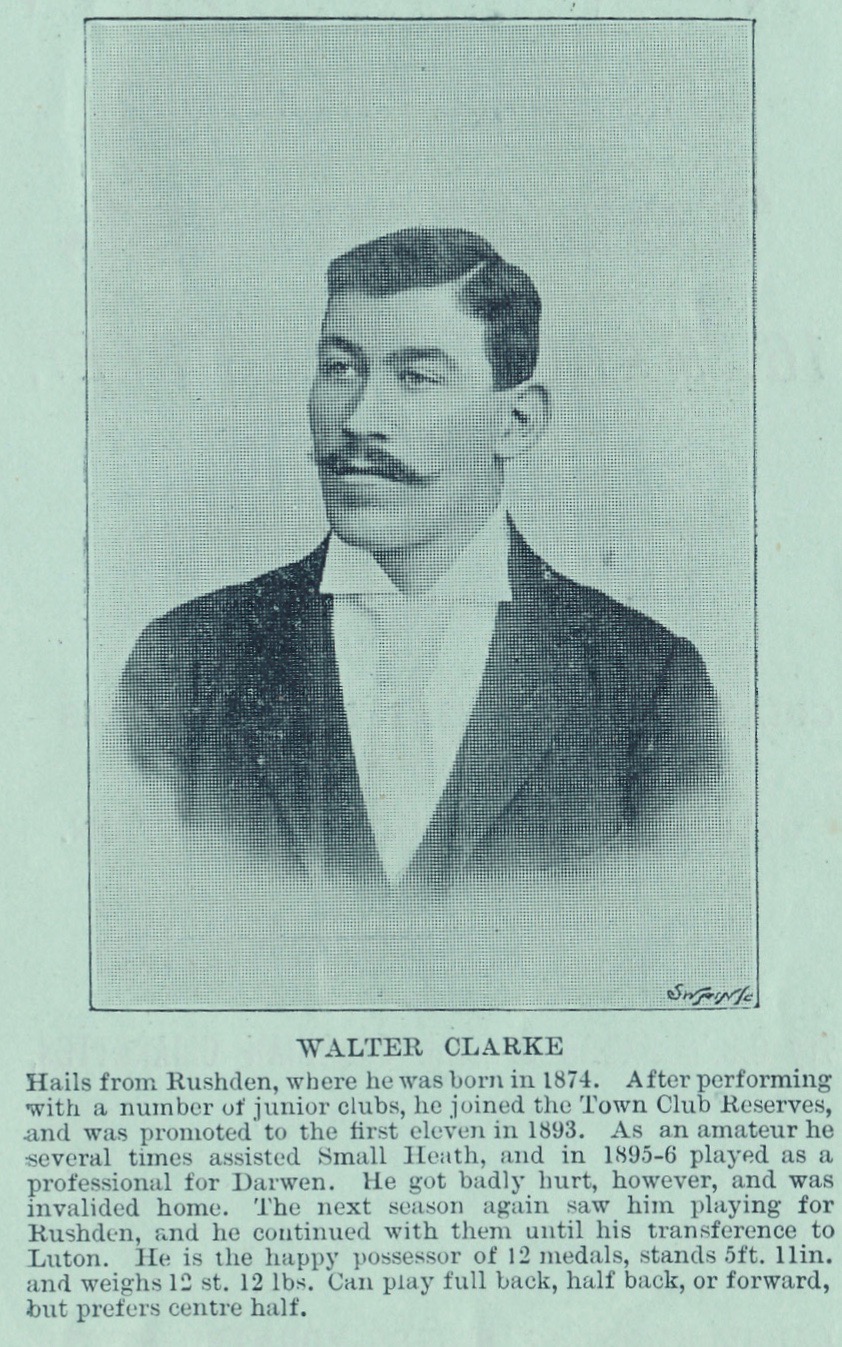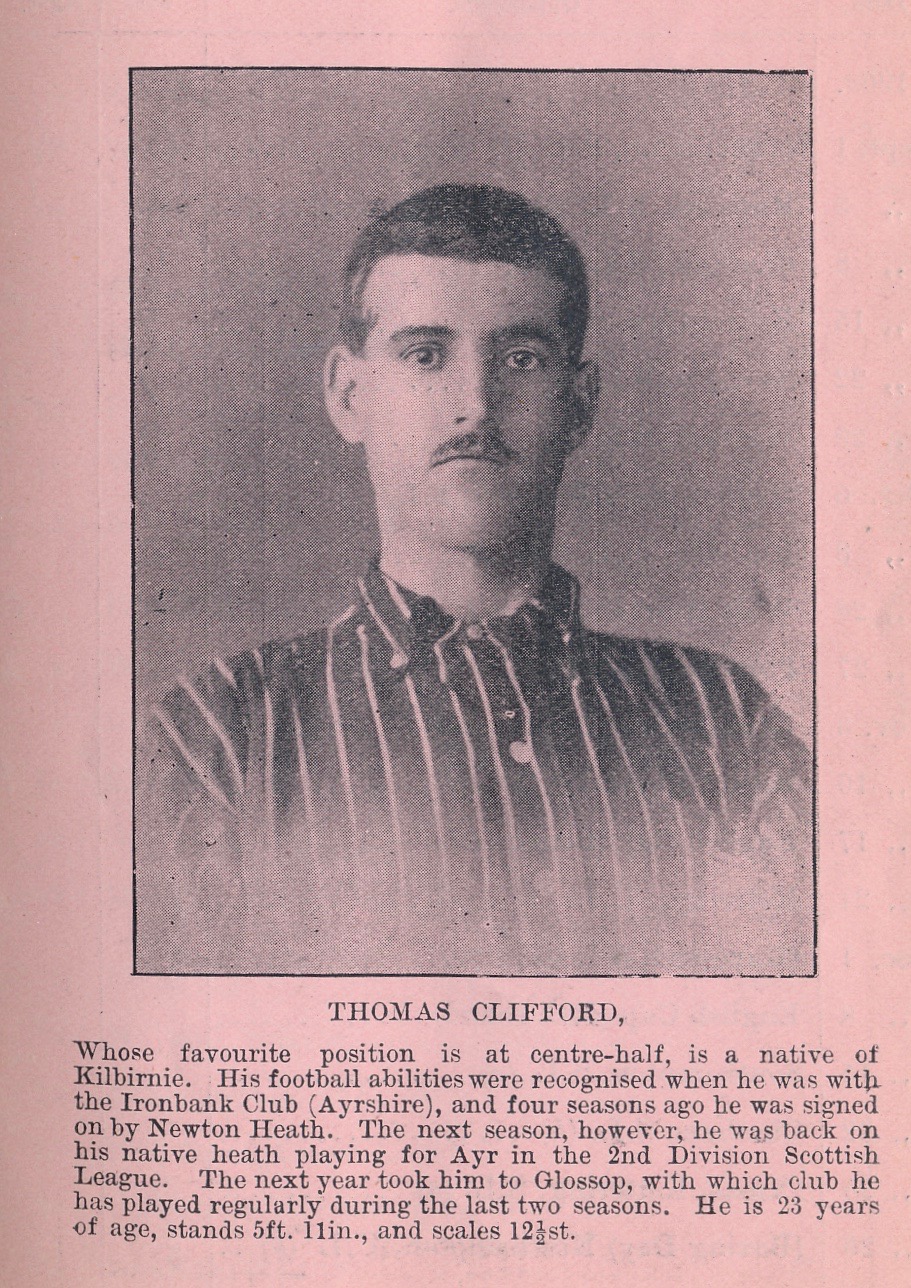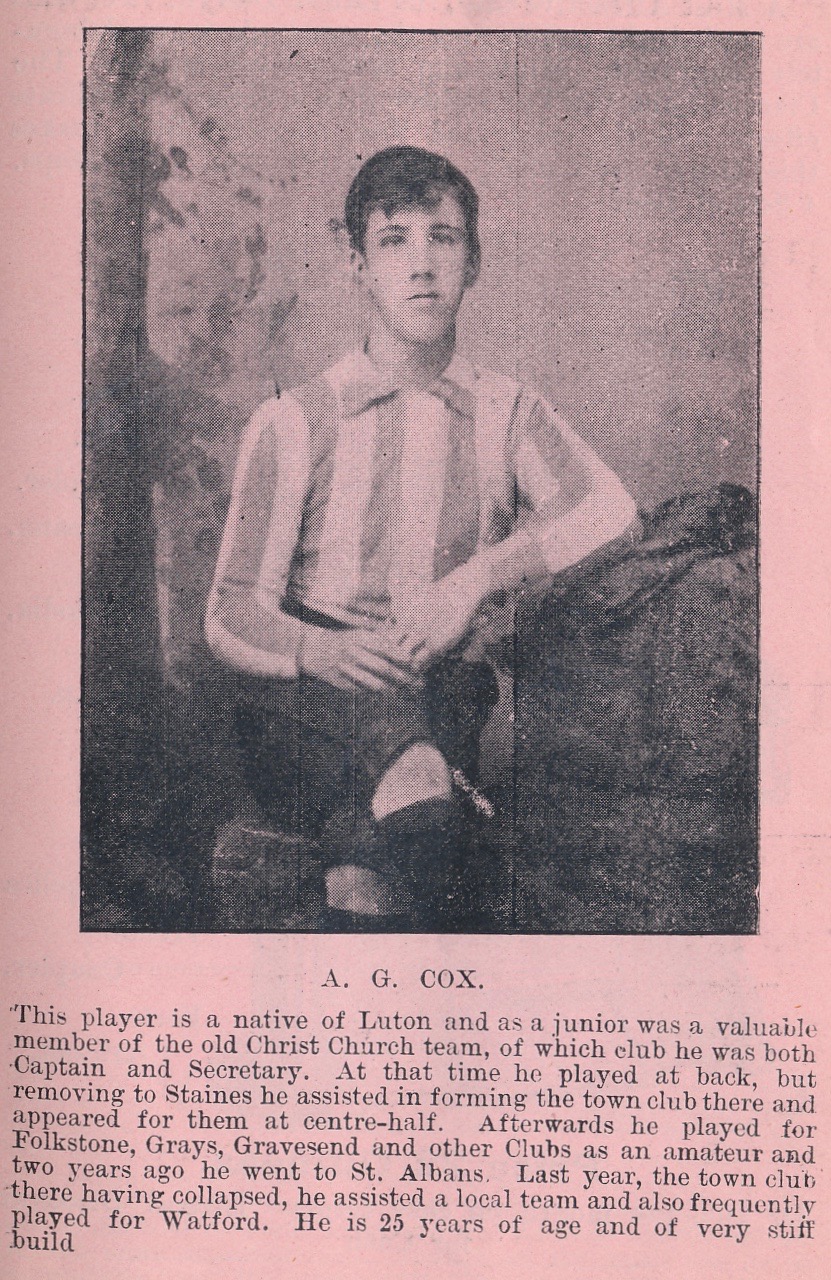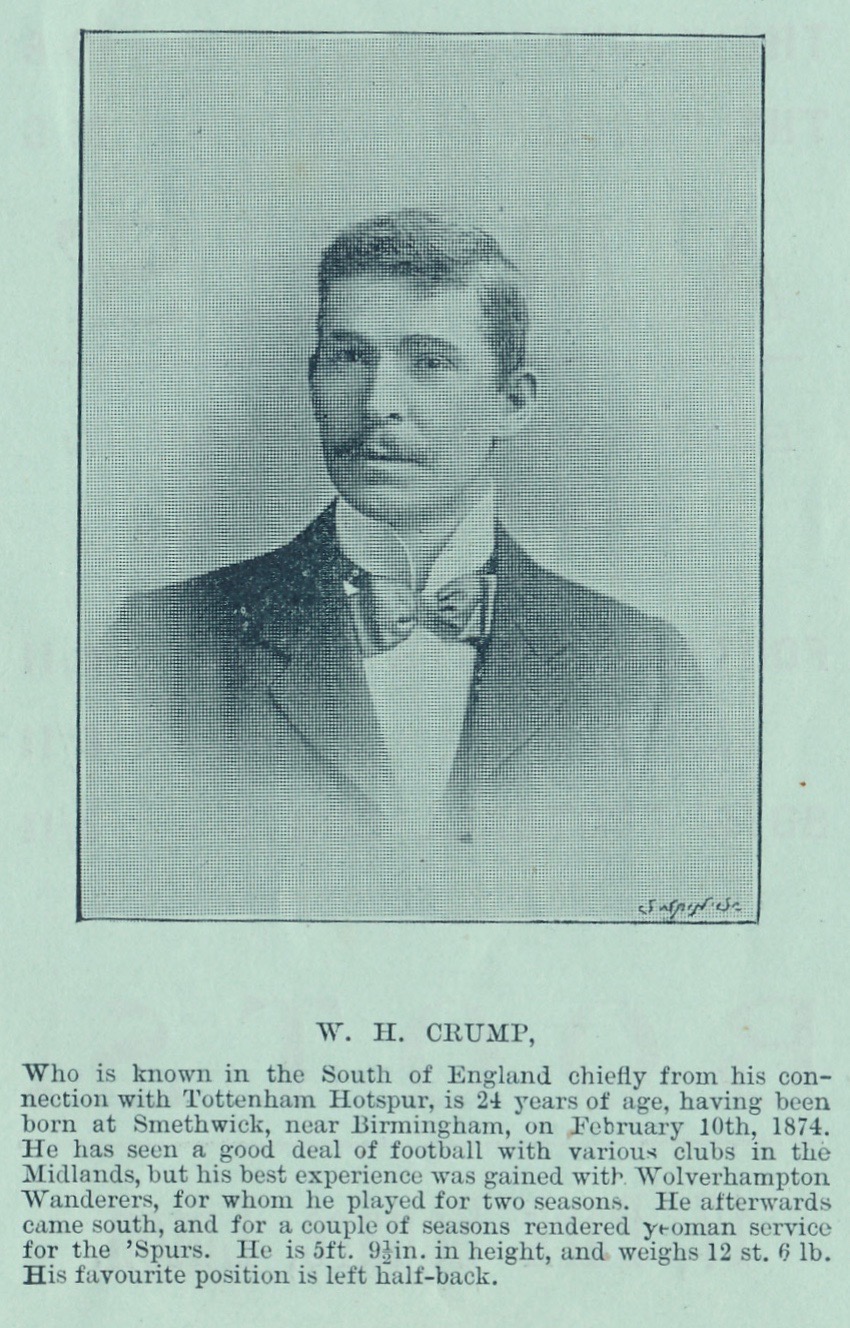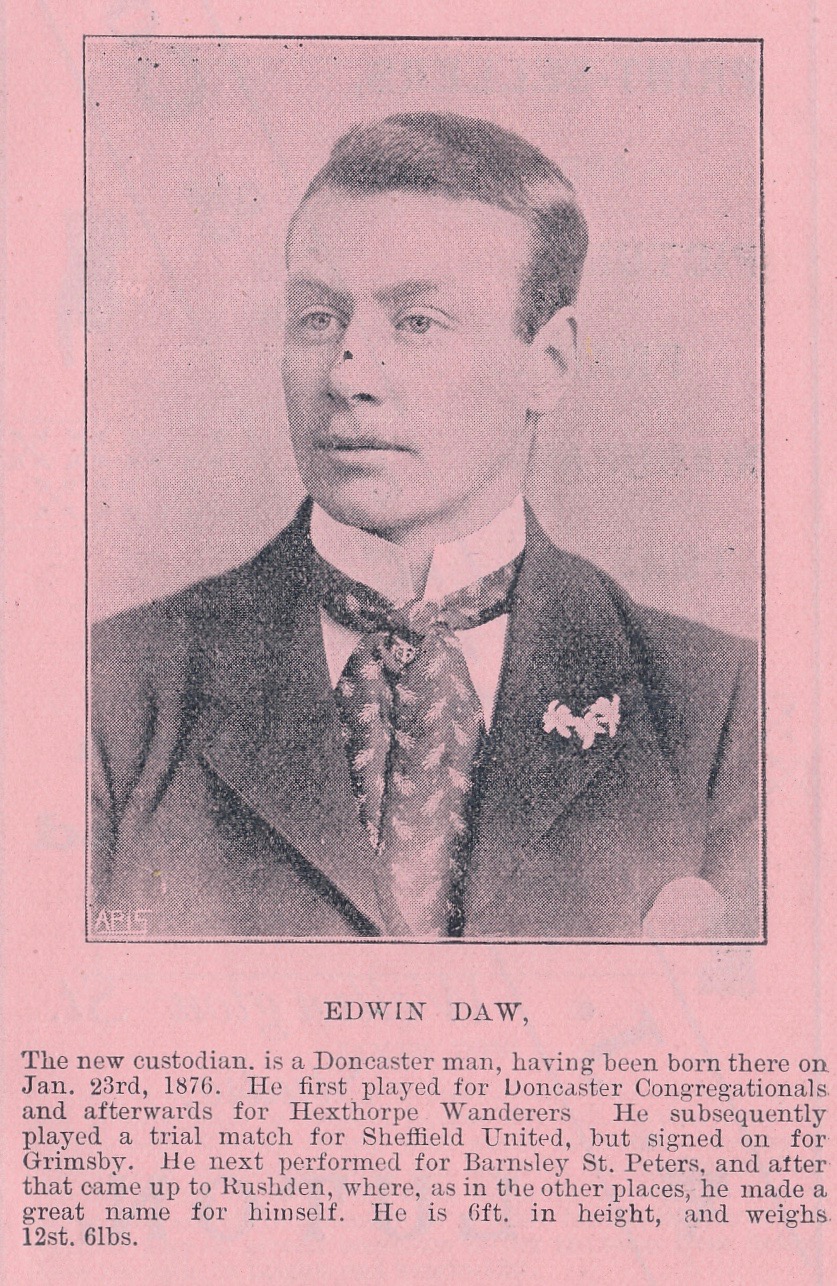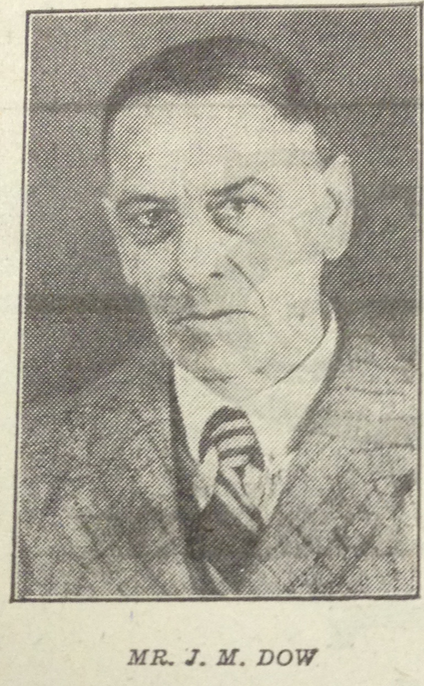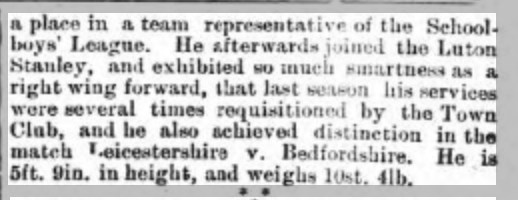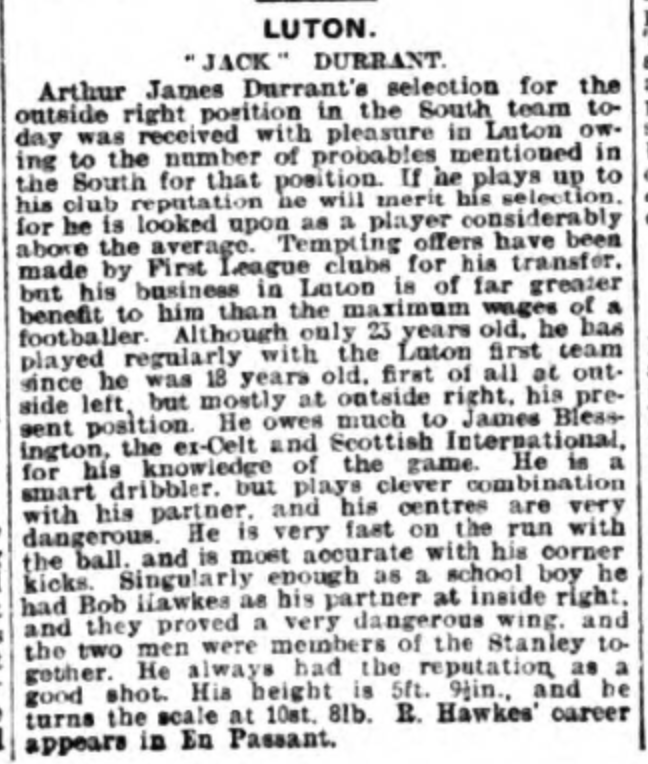Walter Clarke
Walter played 8 times for Luton Town scoring one goal.
Born in Rushden on the 13th July 1874.
A Boot Clicker in Wellingborough.
Married Clara Ellen Perkins and produced two sons and a daughter.
Walter died at 22 Station Road, Higham Ferrers, Northampton on the 27th March 1944.
Thanks to Michael Davage.
************************************************************************************
Thomas Clifford
Born in Kilbirnie on the 14th August 1874
Thomas played 31 times for Luton Town.
He died at Aquitaine France on the 19th January 1917 whilst serving with the 7th Battalion, Royal Scots Fusiliers.
His wife Jane at the time lived in Rankinston, Ayr. Their three children were born in New Cumnock; Old Cumnock and Coylton.
His wife remarried on the 16th April 1923 to Charles Sloan who lived on the same street. She was widowed again in 1941 with one of her sons by the second marriage killed-in-action in World War Two.
They had emigrated to Canada (Oshawa, Ontario) in 1929. At death Jane had 10 grandchildren & two step grand children
Thanks to Michael Davage.
************************************************************************************
Arthur George Cox
Arthur was born on the 25th February 1874. The 1881 census shows him as a pauper of the Luton Union Workhouse. By 1891 Arthur was a Solicitor’s Clerk living with his married brother at 2 Princess Street, Luton. Ten years later he was a bricklayer boarding in St Albans.
Made just 9 appearances for the Straw Plaiters. He went on to play for St. Albans and Hitchin turning amateur in 1903.
Still a bricklayer in 1911 he was married to Jane Ellen and lived at 47A Highbury Road, Luton with a son and two daughters.
Died on the 18th February 1953 at 481 Dunstable Road, aged 78.
*****************************************************************************
William Crump
Born in Smethwick on the 10th February 1873.
He played for Smethwick Centaur, West Smethwick, Wednesfield, Wolves September 1894, Hereford Thistle cs1895, Tottenham trial in August 1896, then permanent. William signed for Luton Town in May 1898 and The Luton Times & Advertiser of 6 May 1898 said he was an excellent capture. He played 45 times for the Straw Plaiters scoring one goal. William moved on to Tottenham in September 1899, Thames Ironworks (guest), Brentford cs 1900 and Watford.
Described as a muscular hard tackling half-back.
For Tottenham he had 106 games for 13 goals.
The 1911 Census describes William as a Professional Cricketer and married 12 years to Clara Agnes Mahon with 4 girls and 3 boys.
The only cricket club found that William played for Birmingham team called Mitchell’s.
He died Burton-on-Trent in early 1918 age 44.
Thanks to Michael Davage
*****************************************************************************
Edwin Daw
Born in Doncaster on the 23rd January 1875.
Played for Doncaster Congregationals, Harthorpe Wanderers, Sheffield United (trial) November 1896, Grimsby Town November 1896, Barnsley St. Peters October 1897, Rushden Town May 1898 and joined Luton Town in May 1899. Edwin played 38 times for the Straw Plaiters.
He moved on to play for Leicester Fosse May 1900, New Brompton June 1902, Doncaster Rovers November 1904, Bradford City November 1905, Oldham Athletic May 1906, Belmont Works (am) November 1907 and finally Leicester Fosse in April 1910.
He was a Railway Carriage Fitter for the Great Northern Railway.
In 1901 he was a professional footballer living at 141 Filbert Street, Leicester.
At the outbreak of World War Two he was a Store Keeper at a Typewriter Manufacturer.
He died in Leicester in early 1944 age 68.
Thank to Michael Davage.
************************************************************************************
George Deacon
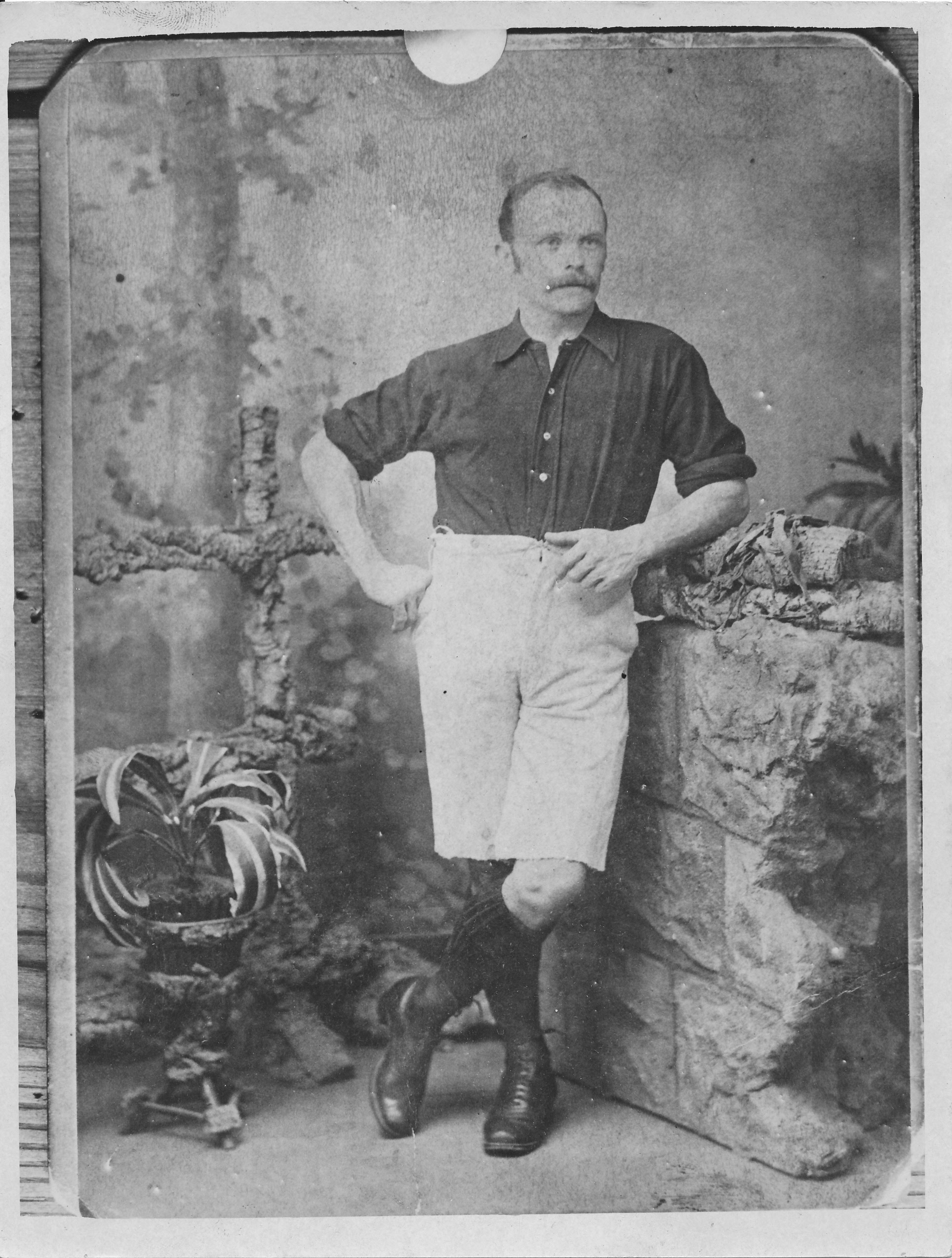 George Deacon was born in Luton in early 1859 and lived at 5 Cobden Street. His father William was a blocker and his mother, Martha, a hat sewer. In 1871 he lived at the back of 200 Old Bedford Road with his parents and brothers William aged ten and Albert aged 6. He had an elder sister, Martha. He married Emma Cherry on the 25th February 1878 at St. Mary’s Parish Church. They lived at 41 Dudley Street, in High Town. He, like his father, was a Straw Hat blocker. Emma was a straw hat sewer. They had 9 children but one died young. George was still a blocker in 1891.
George Deacon was born in Luton in early 1859 and lived at 5 Cobden Street. His father William was a blocker and his mother, Martha, a hat sewer. In 1871 he lived at the back of 200 Old Bedford Road with his parents and brothers William aged ten and Albert aged 6. He had an elder sister, Martha. He married Emma Cherry on the 25th February 1878 at St. Mary’s Parish Church. They lived at 41 Dudley Street, in High Town. He, like his father, was a Straw Hat blocker. Emma was a straw hat sewer. They had 9 children but one died young. George was still a blocker in 1891.
George was a founder member of the Luton Wanderers Football Club which formed in September 1880. He and J.C. Lomax formed a devastating partnership on the wing for the Wanderers. It was George Deacon who put forward the idea of the formation of a Luton Town Football Club. This came after a team of combined players from Luton beat a powerful Newport Pagnell side in 1883. It would take 2 more years and some unpleasantness before his dream would become a reality. He spoke in favour of the formation of a Town Club at the meeting on 11th April 1885 and proved to be a loyal servant to the club. His brother Albert Deacon also played for Luton Town in the early days. George was also a decent cricketer and turned out for Luton Town Cricket Club in the summer.
George served on the club committee until 1890 – at which time players were banned from serving. On the pitch he played in his accustomed position on the wing and was almost ever present every season. It was later said that he only ever missed 6 Wanderers and Luton Town games during his whole career. His dribbling skills were regularly mentioned in reports and he scored the second ever Luton Town hat trick, away to Watford Rovers in October 1886 in a 4 1 victory. Of small stature, he was one of the “little ‘uns” for which the club was famous. He and J.C. Lomax, another man of small stature, played many games on the wing together and the first known Luton Town song was based on them. I believe the song to be based on “Up I came with my little lot” by Herbert Campbell (available on the internet) which was a Music Hall hit at this time.
In May 1938, a correspondent to the Luton News wrote;
“How I loved to see his twinkling feet like an aeroplane propeller in full blast travelling down the wing.”
He added that;
“Chubby was a great favourite.”
From the Luton News of 20th November 1891. Talking about George Deacon when they finally pinned him down to have his photo taken.
“Chubby,” you’re in luck!” Such was my exclamation a day or two since when told that our friend Deacon, who on the right wing of the Luton team has been going through the process, Saturday after Saturday, of making a little man fill as big a space as possible, had been offered an engagement with a notable Birmingham club at the rate of £3 a week and £10 down. But “Chubby” is patriotic, and filthy lucre will not tempt him to desert his old comrades, whom he has accompanied to victory so often.”
We do not know which club approached Chubby, but coming to the end of his career and with so many children to feed, the decision must have been an easy one. The offer was a fitting tribute to his talent.
The Luton News 24th December 1891 gives us a biography.
“George is not a hoary headed old veteran, but still he is a veteran for all that, having first joined a number of frivolous youths in the exciting pursuit of a “bag of wind” as early as the year 1880, and even then his wisdom teeth had been cut some considerable time. He started by playing for the Wanderers, and has been intimately acquainted with Luton football ever since. The first match in which he engaged was against the Luton Excelsior, and the beating of five to nil which the Wanderers sustained on that occasion would have been sufficient to have cooled the ardour of many a bigger fellow than G.D. After trying his fortunes with the Wanderers for four seasons, that club and the Excelsiors agreed to amalgamate their forces under the more ambitious, and at the same tim more satisfactory, title of Luton Town F.C., and George threw in his lot with the newly-formed club, with whom he has been identified from that period up to the present moment. While a member of the Wanderers’ team he played against the Old Etonians in the English Cup Competition. That was the first cup tie ever played in Luton, and the locals retired defeated by three goal to one. Mr Deacon also played for the East Midlands against Cambridgeshire (twice), London Reserves, Leicestershire, and the London West End Association. When he did battle for the Wanderers his position in the field was at outside right, but with Luton Town he had no fixed place until this year, when everything was put in late apple-pie order, and George was located on the inside right. In the English Cup he has played against such clubs as Reading, Chesham, Old Brightonians and Chatham. and he was also in the final for the Kettering Cup against Grantham Rovers. Under the well-know sobriquet of “Chubby,” the subject of our sketch frequently comes in for a large share of encouragement from the crowd which assembles from week to week on the Dunstable-road ground, and “Go it, Chubby,” and Well Done, Chubby,” are some of the commonest cries that are heard. As regards accidents he has been very fortunate, never having had what might be called a serious one. Such an immunity from mishaps is not to be attributed to any unusual carefulness on his part, for he is one of the pluckiest men on the field. Though not standing a great deal about five feet nothing, he has never been known to show the white feather to even the biggest of his opponents, and only on Saturday last he gave a capital exhibition of his dash and go. George is the oldest member in the team, but I have his word for it that he has no intention of giving up the game for as long as there is a vacancy in the Luton Town Football Club.”
Feeling his age, and no doubt worn out by fatherhood, George decided to retire in early 1892. He suffered a bad injury in January 1892 and missed a couple of games and played his last game against the 1st Scots Guards on 2nd April 1892. The committee tried to persuade Chubby to play until the end of the season. As a good replacement for him on the wing had been found, he stepped down.
The Luton Reporter of the 7th May 1892 gives us an excellent account of his retirement presentation.
“The termination of a highly successful season was signalled on Saturday by the holding of a tea meeting at the Cowper Arms coffee tavern at which a goodly number of members attended. An excellent repast was provided by Mr S. Heath. At the after meeting the Secretary of the Club (Mr I. Smith) occupied the chair. At the outset it was decided, on the suggestion of Mr Smith, that a wreath should be sent from the members as a token of respect to the late Mr J. Long. Mr Smith thereafter proceeded with the most interesting portion of the evening’s programme – the making of a presentation to Mr G. Deacon, who has recently retired from his place in the team after a lengthened connection with the game. Mr Smith observed that they had met to do honour to one of their oldest players, who from increasing years could no longer do justice to himself by continuing in the ranks. The members of the team were very sorry to lose such an old friend, but at the same time they fully appreciated his motive for retiring. They were amongst the first to acknowledge that a man could not go on playing football for ever and that with increasing years both head and feet lost their cunning. They trusted that when the time came for the other members of the eleven to retire they might have as good a send-off as “Chubby” was having now. Mr Smith subsequently said that to enlarge on the doings of Mr Deacon would simply to give the history of Luton football. Many would remember his play on the left wing in the Wanderers’ ranks with Mr C. Lomax. He joined the Town Club at its formation and the “little un,” as Captain Taylor called him, now considered it time to retire in favour of a younger man. He had on behalf of the members to present £8 17s 1d., the amount received up to date, and he hoped that amounts still to come in would bring up the total to £10. In conclusion the secretary trusted that Mr Deacon might continue to be associated with local football in some capacity. Mr Deacon, who was warmly applauded said he was very much obliged to them for the honour they had shown him and those gentlemen who had subscribed to the testimonial. He received it with the best of thanks. What he had done in the football field he had always enjoyed, and he was only sorry that he had to retire. He thought, however, that in Mr R. Brown they had a young player who would make as good a man as he (the speaker) had been in the past. He again expressed his acknowledgements of the kind feeling which had prompted the gift. The remainder of the evening was given up to the musical selections and recitations. Songs were given by Messrs Heath, A. Sanders, Underwood and other members of the company, and a very pleasant time was passed. Mr S. Baker presided at the pianoforte in very efficient style.”
The Luton News of 21st April 1892 adds;
“I am pleased to say that George Deacon has been appointed “pro” at Norton College for the coming season. I hope he will so coach the boys so that they will have a vey successful season.”
The Luton Reporter football column “With Bat, Ball and Bicycle” commented as follows:
“The close of the season was marked in a very pleasant fashion by members of the Football Club, a number of whom took tea together. A convivial gathering followed, when the chief business was the presentation of a testimonial to Deacon. This plucky little player has now definitely abandoned the “reds,” and it was very fitting that he should receive a tangible recognition of his undoubted merit. The presentation was made in grateful terms by Mr Smith, and all who are acquainted with the recipient will endorse the high encomiums which were passed upon him. He has been connected with Luton football for many years and now only retires because he recognises that he has passed his zenith and is descending into “the sere and yellow leaf.”
Deacon’s recognition of the kindness of his friends was couched in homely phraseology, but it had the right ring about it, and I sympathised very heartily with him in his reluctance to resign his place in the eleven. He feels, however, that the keenness of his regret is to some extent removed by the reflection that his successor has the makings of a competent player. I entirely coincide with this view and hope that the good opinion which I have formed of Brown’s capabilities will be borne out by his play in another season. Deacon has always received a good word in this column and I join with others of his admirers in the wish that he may be long spared to assist in advancing the game locally”.
In September 1892 the committee appointed George to the post of “attendant” at 1/- per week. The following season he was appointed “trainer” at 2/6 per week. He is pictured in this capacity in a number of team photos.
George continued to live in Luton. He had nine children with Emma who died in 1901. He remarried, to Emily, and had a further three children. At the time of the 1911 census he was a Straw Hat machinist and lived at 9 Victoria Street. The extract below is from the Luton News 1939.
George Deacon died in 1943 and his obituary from the Luton News is reproduced, left. A Lutonian, he was the inspiration behind the formation of the club, a player, committee member and trainer. The word “legend” is applied too easily these days. George Deacon is a true Luton Town legend.
Thanks to the Luton News
*****************************************************************************
James William Dickson
James William Dickson was born in Swansea on the 24th August 1869. He went to St. Albans Grammar School and entered Oxford University on 16th October 1889. He made his debut for St. Albans in 1885 as a half-back. However, he spent most of his career up front and scored on a regular basis. The photo comes from the St. Albans team photo of 1891/92. James lived in St. Albans with his parents as a graduate Law student and then as a practicing solicitor. He continued to play for St. Albans and made some appearances for Watford Rovers.
It appears that Sandford Moore took James along to Luton Town and he made his debut on the 8th November 1890 in the Kettering Charity Cup match against Wolverton L.& N.W. The match was played at the Bury, as the Dallow Lane ground was being upgraded, and ended in a 2 2 draw. James played poorly at centre forward and was moved to the right wing where he had more success.
His only other reported game was the replay which was was held up by a fixture problem and bad weather so it was not played until the 15th January 1891. James played well on the right wing but could not prevent a 2 1 defeat for the Straw Plaiters after extra time. He is mentioned in February 1891 as playing for the reserves.
James continued to played for St. Albans regularly. His last game was in December 1894. The Saints imported four ex Luton players at this time so it may be that he reverted to the reserves. Possibly work got in the way as he became a successful solicitor in the city. He continued to live with his parents and married when he was 57.
James worked as a solicitor in St. Albans until he was 78. He died in 1948 while residing at Marcom, Arle Drive, Cheltenham. The local newspaper described him as “a former solicitor who had lived in Cheltenham since his retirement last October.” The report continues; “Aged 79, Mr Dickson resided with his sister, Mrs E. Sargent, and had been in failing health since the death of his wife some months ago. He was educated at St. Alban’s School, London and at Exeter College, Oxford.”
Thanks to David Tavener/St Albans City and St Albans Library.
********************************************************************************************
James Dow
James played 83 times for the club scoring 6 goals. Known as John, he stayed in Luton and there is a “J. Dow” who played for Luton Town Cricket Club and topped the batting averages in their first season – 1906. I need to nail that one down. The following photograph of James appeared in the Luton News in 1933.
******************************************************************************
Jack Durrant
The Leighton Buzzard Observer of the 13th September 1898 reported on his signing, below;
The Athletic News of the 25th January 1904 gave Jack’s biography;


